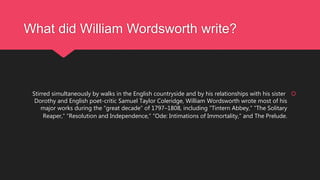William Wordsworth.pptx
- 2. Why is William Wordsworth important? ï William Wordsworth (1770â1850) produced some of the greatest English poems of the late 1700s and early 1800s. In contrast to the decorum of much 18th-century verse, he wanted to relate âsituations from common lifeâ in âlanguage really used by men,â embodying âthe spontaneous overflow of feelingsâĶrecollected in tranquilityâ (preface to Lyrical Ballads [1802]).
- 3. What was William Wordsworthâs childhood like? ï William Wordsworth grew up in the Lake District of northern England. There he spent much of his boyhood playing outdoors and exploring the mountains and lake-strewn valleysââfoster'd alike by beauty and by fear,â as he would later testify in his autobiographical poem The Prelude; or, Growth of a Poetâs Mind.
- 4. What did William Wordsworth write? ï Stirred simultaneously by walks in the English countryside and by his relationships with his sister Dorothy and English poet-critic Samuel Taylor Coleridge, William Wordsworth wrote most of his major works during the âgreat decadeâ of 1797â1808, including âTintern Abbey,â âThe Solitary Reaper,â âResolution and Independence,â âOde: Intimations of Immortality,â and The Prelude.
- 5. Early life and education ï Wordsworth was born in the Lake District of northern England, the second of five children of a modestly prosperous estate manager. He lost his mother when he was 7 and his father when he was 13, upon which the orphan boys were sent off by guardian uncles to a grammar school at Hawkshead, a village in the heart of the Lake District. At Hawkshead Wordsworth received an excellent education in classics, literature, and mathematics, but the chief advantage to him there was the chance to indulge in the boyhood pleasures of living and playing in the outdoors. The natural scenery of the English lakes could terrify as well as nurture, as Wordsworth would later testify in the line âI grew up fostered alike by beauty and by fear,â but its generally benign aspect gave the growing boy the confidence he articulated in one of his first important poems, âLines Composed a Few Miles Above Tintern AbbeyâĶ,â namely, âthat Nature never did betray the heart that loved her.â
- 6. William Wordsworth ï Wordsworth moved on in 1787 to St. Johnâs College, Cambridge. Repelled by the competitive pressures there, he elected to idle his way through the university, persuaded that he âwas not for that hour, nor for that place.â The most important thing he did in his college years was to devote his summer vacation in 1790 to a long walking tour through revolutionary France. There he was caught up in the passionate enthusiasm that followed the fall of the Bastille, and became an ardent republican sympathizer. Upon taking his Cambridge degreeâan undistinguished âpassââ he returned in 1791 to France, where he formed a passionate attachment to a Frenchwoman, Annette Vallon. But before their child was born in December 1792, Wordsworth had to return to England and was cut off there by the outbreak of war between England and France. He was not to see his daughter Caroline until she was nine.
- 7. The great decade: 1797â1808 ï While living with Dorothy at Alfoxden House, Wordsworth became friends with a fellow poet, Samuel Taylor Coleridge. They formed a partnership that would change both poetsâ lives and alter the course of English poetry.
- 8. The end .


![Why is William Wordsworth important?
ï
William Wordsworth (1770â1850) produced some of the greatest English poems of the late 1700s
and early 1800s. In contrast to the decorum of much 18th-century verse, he wanted to relate
âsituations from common lifeâ in âlanguage really used by men,â embodying âthe spontaneous
overflow of feelingsâĶrecollected in tranquilityâ (preface to Lyrical Ballads [1802]).](https://image.slidesharecdn.com/williamwordsworth-220913142026-d64659c1/85/William-Wordsworth-pptx-2-320.jpg)





